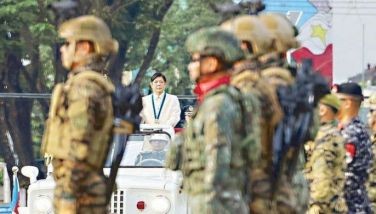RP support for US needs Congress’ okay
September 17, 2002 | 12:00am
SUBIC FREEPORT — President Arroyo will need the approval of Congress for any assistance she would offer the United States in its imminent attack on Iraq, former Senate President Jovito Salonga said yesterday.
"She will violate the Constitution if she will allow the United States to use the country’s air space, airports, seaports, and other facilities in its war against Iraq and terrorism," Salonga told hundreds of personnel of the Subic Bay Metropolitan Authority (SBMA) and other guests here.
Along with Vice President Teofisto Guingona Jr., the former senator was guest in ceremonies commemorating the 11th anniversary of the rejection of the RP-US Bases Agreement by the Senate on Sept. 16, 1991.
The commemoration was organized by the Liberal Party headed by Batanes Rep. Florencio Abad, and of which Salonga was former president, and the SBMA, which is chaired by former Bataan Rep. Felicito Payumo.
Salonga was then Senate president when the chamber, which is empowered by the Constitution to ratify or reject treaties and other international agreements, junked the proposed extension of the RP-US bases treaty.
He criticized the Arroyo administration for its "bootlicking" unilateral offer last week of use of Philippine facilities by the US in case the latter decides to finally attack Iraq.
However, he said he was happy to note that the President has since backtracked with an announcement that the country would await and comply with any resolution of the United Nations on the matter.
He warned Mrs. Arroyo that she would violate the Charter if she allows use of the country’s facilities even if the UN sanctions the imminent US war against Iraq.
He said the Constitution explicitly provides that the President needs a congressional declaration of the "existence of a state of war" before such assets are made available to the US.
Such declaration needs a two-thirds vote of all members of both chambers of Congress voting separately, he said.
"She does not have the power to commit us on the side of the United States in its war against Iraq and terrorism. That power rests exclusively with Congress," he stressed.
Salonga led 11 other colleagues in sending the American bases out despite appeals by then President Corazon Aquino that they extend the use by the US of such facilities. Mrs. Aquino even led a rally one rainy day to lobby for the approval of the treaty.
The 11 others were Joseph Estrada, who later became president but was ousted, Aquilino Pimentel Jr., Juan Ponce Enrile, Ernesto Maceda, Orlando Mercado, Rene Saguisag, Victor Ziga, Sotero Laurel, Wigberto Tañada, Guingona and Agapito Aquino, a brother-in-law of Mrs. Aquino.
In voting with the anti-bases group, Aquino, now a Makati congressman, then declared: "I love my country more than I love my President."
Aquino, Ziga and Laurel attended yesterday’s ceremonies with Salonga and Guingona.
Robert Fisher of Federal Express, the American courier giant which has its regional hub here, was a special guest.
Guingona, Laurel and Tañada agreed with their former Senate president that Mrs. Arroyo needs congressional concurrence for any support she would offer the US.
Salonga said he had only the interest of the country in mind when he led the Senate in rejecting the US bases treaty, a decision which could have tremendously harmed his chances in the 1992 presidential elections.
He said he was happy to note the success of this former American naval facility 11 years after that momentous vote.
Payumo reported to his visitors that Subic is a story of hard work.
"We turned (military) quarters and barracks into hotels and dormitories, jungle training and magazine sites into eco-tourism attractions . . . flatlands became industrial and commercial areas. The Alava pier right behind us is where aircraft carriers and destroyers used to dock. It is now used to berth commercial ships and cargo vessels. Even as I speak today, there are 26 vessels berthed inside the Subic Bay," he said.
He said there are now more than 600 companies in Subic and the entire Freeport, including SBMA, now employs 55,000 workers, 25,000 more than the employment peak during the US Navy days.
"These companies have exported $6.1 billion worth of products to date. They are expected to export $1.4 billion this year alone. Subic also contributes to the national treasury. For 2001 alone, a total of P3.57 billion have been collected by Customs and the BIR for duties and taxes on importations and the five percent tax on gross income of enterprises," he added.
Payumo added that the upcoming intermodal transport hub project, the main feature of which is a toll road that will link Subic’s seaport to Clark’s airport in Pampanga, will give the locators based in these two bustling economies the competitive edge.
He also said that the Freeport perspective opened new horizons towards better and enhanced relationship through trade and business with the US, "instead of alienating an ally or souring a special friendship." — With Jen Velarmino
"She will violate the Constitution if she will allow the United States to use the country’s air space, airports, seaports, and other facilities in its war against Iraq and terrorism," Salonga told hundreds of personnel of the Subic Bay Metropolitan Authority (SBMA) and other guests here.
Along with Vice President Teofisto Guingona Jr., the former senator was guest in ceremonies commemorating the 11th anniversary of the rejection of the RP-US Bases Agreement by the Senate on Sept. 16, 1991.
The commemoration was organized by the Liberal Party headed by Batanes Rep. Florencio Abad, and of which Salonga was former president, and the SBMA, which is chaired by former Bataan Rep. Felicito Payumo.
Salonga was then Senate president when the chamber, which is empowered by the Constitution to ratify or reject treaties and other international agreements, junked the proposed extension of the RP-US bases treaty.
He criticized the Arroyo administration for its "bootlicking" unilateral offer last week of use of Philippine facilities by the US in case the latter decides to finally attack Iraq.
However, he said he was happy to note that the President has since backtracked with an announcement that the country would await and comply with any resolution of the United Nations on the matter.
He warned Mrs. Arroyo that she would violate the Charter if she allows use of the country’s facilities even if the UN sanctions the imminent US war against Iraq.
He said the Constitution explicitly provides that the President needs a congressional declaration of the "existence of a state of war" before such assets are made available to the US.
Such declaration needs a two-thirds vote of all members of both chambers of Congress voting separately, he said.
"She does not have the power to commit us on the side of the United States in its war against Iraq and terrorism. That power rests exclusively with Congress," he stressed.
Salonga led 11 other colleagues in sending the American bases out despite appeals by then President Corazon Aquino that they extend the use by the US of such facilities. Mrs. Aquino even led a rally one rainy day to lobby for the approval of the treaty.
The 11 others were Joseph Estrada, who later became president but was ousted, Aquilino Pimentel Jr., Juan Ponce Enrile, Ernesto Maceda, Orlando Mercado, Rene Saguisag, Victor Ziga, Sotero Laurel, Wigberto Tañada, Guingona and Agapito Aquino, a brother-in-law of Mrs. Aquino.
In voting with the anti-bases group, Aquino, now a Makati congressman, then declared: "I love my country more than I love my President."
Aquino, Ziga and Laurel attended yesterday’s ceremonies with Salonga and Guingona.
Robert Fisher of Federal Express, the American courier giant which has its regional hub here, was a special guest.
Guingona, Laurel and Tañada agreed with their former Senate president that Mrs. Arroyo needs congressional concurrence for any support she would offer the US.
Salonga said he had only the interest of the country in mind when he led the Senate in rejecting the US bases treaty, a decision which could have tremendously harmed his chances in the 1992 presidential elections.
He said he was happy to note the success of this former American naval facility 11 years after that momentous vote.
Payumo reported to his visitors that Subic is a story of hard work.
"We turned (military) quarters and barracks into hotels and dormitories, jungle training and magazine sites into eco-tourism attractions . . . flatlands became industrial and commercial areas. The Alava pier right behind us is where aircraft carriers and destroyers used to dock. It is now used to berth commercial ships and cargo vessels. Even as I speak today, there are 26 vessels berthed inside the Subic Bay," he said.
He said there are now more than 600 companies in Subic and the entire Freeport, including SBMA, now employs 55,000 workers, 25,000 more than the employment peak during the US Navy days.
"These companies have exported $6.1 billion worth of products to date. They are expected to export $1.4 billion this year alone. Subic also contributes to the national treasury. For 2001 alone, a total of P3.57 billion have been collected by Customs and the BIR for duties and taxes on importations and the five percent tax on gross income of enterprises," he added.
Payumo added that the upcoming intermodal transport hub project, the main feature of which is a toll road that will link Subic’s seaport to Clark’s airport in Pampanga, will give the locators based in these two bustling economies the competitive edge.
He also said that the Freeport perspective opened new horizons towards better and enhanced relationship through trade and business with the US, "instead of alienating an ally or souring a special friendship." — With Jen Velarmino
BrandSpace Articles
<
>
- Latest
- Trending
Trending
Latest
Trending
Latest
Recommended
November 26, 2024 - 12:00am




























